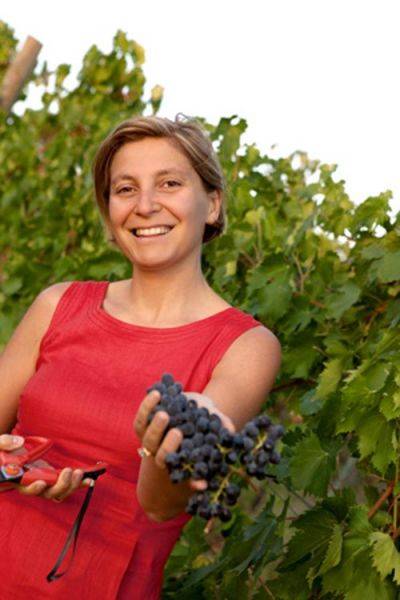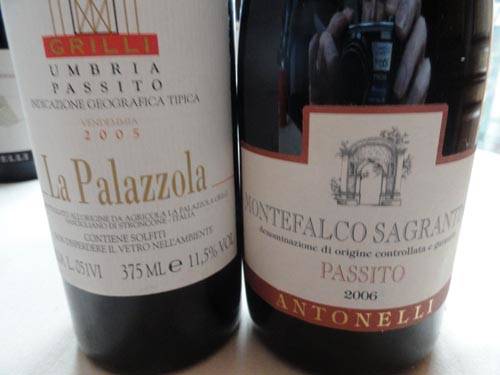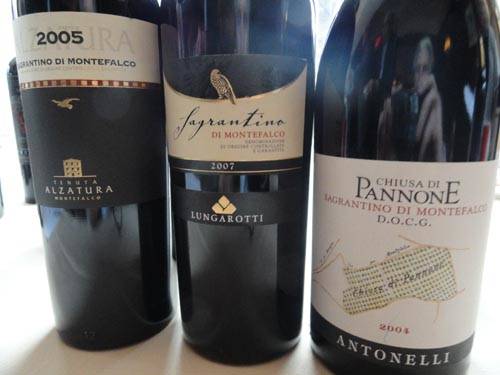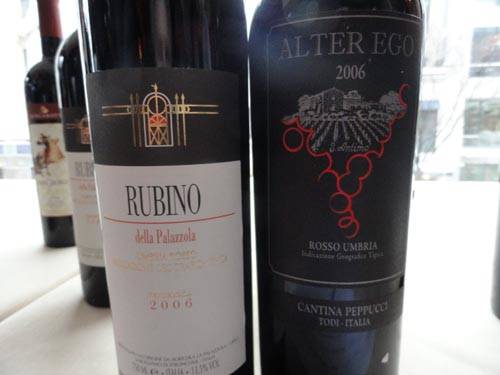Chiara Lungoratti on the Wines of Umbria at the Wine Media Guild
With only one free day when I attended last year’s Sagrantino event, I decided to ask Chiara Lungarotti to show me Cantina Lungarotti’s new winery in Montefalco. What better way to learn more about Umbria and its wines. Even though it was a Saturday she said yes. Chiara and I talked about wine in general, Umbrian wine in particular, and her wines as we tasted them. I am always impressed with her wine knowledge so I invited her to come to NYC to do a presentation for the Wine Media Guild on the wines of Umbria. Chiara is very passionate about all things Umbrian and works very hard to promote her region and its wines. I was very happy when she accepted my invitation.
Chiara planned the tasting to include at least one wine from each of the wine producing regions of Umbria. She said the two most important red grapes in Umbria are Sangiovese and Sagrantino and the most important white grape is Grechetto. All but three of the 20 wines we tasted were made with at least one of these grapes. Chardonnay, Cabernet and Merlot are also grown here.
The Wines
Grechetto di Todi Colli Martani “Montorsolo” DOC 2009 100% Grechetto di Todi Cantina Peppucci the vines are on the hills of Montorsolo which are rich in limestone and clay. The harvest takes place in the middle of September. The wine is clarified by the “debourbage” and fermented in stainless steel tanks with periodic “batonnages”
then bottled and released. At $12 it is a very good buy.
Chiara explained that traditionally Orvieto was amabile, slightly sweet, and it was only in the last 50 years that it has become a dry wine. Today she said very few producers make an amabile. There are many tunnels and caves under Orvieto built into the volcanic rock. Many of the wine merchants in Orvieto have their cellars in these caves right in the town. When the Duomo was being built, construction began in November 1290; the workers’ contract stated that they would be given this wine every day.
Orvieto Classico Superiore “Terre Vineate” DOC 2009 50% Procanico, 30% Grechetto and 20% Verdello Durpeggio and Malvasia Azienda Agricola Palazzon. The wine is fermented in stainless steel for 20 days. It had more body then I expected and nice fruit with hints of white peaches $17
Torre di Giano, Bianco di Torgiano DOC 2009 Lungarotti. Made from 70% Trebbiano and 30% Grechetto. The soil is clay with good water retention and there are 4,000 vines per hectare. The Grechetto is harvested in the beginning of September and the Trebbiano in the middle of September. The wine is made from the free run juice, after a brief cryomaceration, and is vinified in stainless steel at low temperatures. It is kept on the lees at low temperatures until bottling. $15
Sangiovese dell’Umbria “Vigna La Pieve” IGT 2006 Cantina Fanini 100% Sangiovese There are 5,500 vines per hectare. Fermentation and maceration takes place in stainless steel. This wine is aged in second and third passage barriques for not less than 12 months and in bottle for not less than six months before release. This a very pleasant fruity wine easy to drink. $23
Assisi Rosso DOC 2008. Sportoletti Made from 50% Sangiovese, 30% Merlot and 20% Cabernet. The vineyard is 400 meters above sea level and the harvest takes place in mid-September. Fermentation is stainless steel for 10/15 days with steeping and regular mixing. The wine is then aged in wood for some months and in bottle before it is released. I have not had many wines from this DOC and this one had nice red fruit aromas and flavors with a hint of cherry. $18
Rubesco Rosso di Torgiano DOC 2007 Lungarotti 70% Sangiovese and 30% Canaiolo. The soil is clay and sand of medium depth with limestone sub soil. There are 4,000 vines per hectare and the harvest takes place in September/October. Fermentation takes place in stainless steel tanks with 18 days maceration on the skins. It is aged for 12 months in oak casks; lightly filtered before bottling. This is an easy drinking wine with red fruit aromas and flavors and hints of black cherry with a very pleasant finish and aftertaste, a bargain at $15.
Rubesco Riserva “Vigna Monticchio”, Torgiano Rosso Riserva DOCG 2005
Lungarotti Sangiovese 70% and Canaiolo 30% Fermented in stainless steel and maceration on the skins for about 25 days. It is aged in barriques for one year and then for several years in bottle before release. In the past it was aged almost 10 years before release, now it is closer to 5 years. The 2005 is the current vintage. I have been drinking this wine since 1981 when I first visited the winery in Torgiano and drank the 1973 vintage. The wine was granted its own DOCG in 1990. The Rubesco Riserva is a wine that can age for 30 years. $55
Rubino 2006 Umbria Rosso IGT La Palazzola 80% Cabernet Sauvignon and 20% Merlot the vineyard is 250/300 meters above sea level and the soil is clay, rich in skeletal deposits. Merlot is harvested the second week in September and the Cabernet Sauvignon the first week of October. Maceration is on the skins for 25 days in stainless steel. It is aged for 12 months in barriques. This is a big wine a with a lot of fruit, and a good finish and aftertaste. $50
San Giorgio, Umbria Rosso IGT 2004 Lungarotti 50% Cabernet Sauvignon, 40% Sangiovese and 10% Canaiolo. The vineyard for the Cabernet Sauvignon is pebbles and tangentially limestone. The Sangiovese and Canaiolo vineyard is clay and sand with limestone subsoil. There are 4,000/5,000 vines per hectare. The harvest takes place the second week of September. It is fermented in stainless and maceration on the skins for 18 days followed by 12 months in barriques. It is aged in the bottle for 36 months before release. This is a big wine with red berry aromas and flavors and hints of leather and rhubarb. $62
Recently Italian producers from outside Umbria have been coming to Montefalco and building wineries. Chiara also wanted to expand but wanted to stay within Umbria where she feels at home. A few years ago they brought land in Torrota di Montefalco and opened up a winery there. It is only 45 minutes away from the main winery in Torgiano.
A few producers also make a Montefalco Rosso Riserva. Chiara felt that this was a mistake. She felt that there was not much difference between the regular and the riserva (the riserva is aged longer) and that it would confuse the consumer.
Montefalco Rosso DOC 2008 Lungarotti Blends of 70% Sangiovese, 20% Merlot and 10% Sagrantino. Soil is a combination of clay and sand, with 4500 vines per hectare.
The harvest takes place in September/October. It is fermented in stainless steel with 25 days skin maceration, aged in French oak barriques for 12 months, and six months in bottle before release. It has aromas and flavors of red berries, violets and a hint of coffee. $48
Chiara said that in 1970 there were only 5 hectares of Sagrantino in Montefalco!
The name Sagrantino comes from the Latin sacer, a holy wine used doing Christian festivals. The Passito is a sweet dessert wine and is the traditional version of Sagrantino di Montefalco.
Alter Ego Umbria Rosso IGT 2006100% Sagrantino Cantina Peppucci Even though this wine is 100% Sagrantino the vineyards are outside the classified zone and therefore it is IGT and not DOCG. This is the reason for its name. $23. This is a good buy.
Sagrantino di Montefalco DOCG 2007 Lungarotti 100% Sagrantino. The soil is a medium mix with small pebbles and clay and the vineyard has full southern exposure. The harvest takes place in mid-October. Fermented in stainless steel with maceration on the skins for 28 days and aged for 12 months in French oak barriques. There is a light filtration before the wine is bottled and it spends 20 months in the bottle before release. This is a complex, tannic wine with red fruit, cherries and blueberries and a touch of spice. $48
Sagrantino di Montefalco DOCG 2005 Tenuta Alzatura 100% Sagrantino. The wine is fermented for 26 days in temperature-controlled stainless steel tanks with frequent pumping over. It is aged for 16 month in French oak barriques and eight months in bottle before release. It has concentrated black fruit aromas and flavors with hints of leather and coffee. The estate is owned by the Cecchi family of Tuscan fame.
Sagrantino di Montefalco “Chiusa di Pannone” DOCG 2005 Antonelli 100% Sagrantino. The soil is of pleistocene origin, calcareous clay, rich in gravel and fluvio-lacustrine conglomerates(professor Attilio Scienza at Vino 2011). Chiusa di PannonE is the name of the vineyard and it is 400 meters above sea level. Vines are grafted on rootstock 420A. The grapes are handpicked into boxes the second and third week of October. Fermentation in contact with the skins for 20 days and malolatic fermentation takes place in wood. The wine is aged in lightly toasted 500liter barrels for six months and 25HL barrels for 15 months. This is followed by assembling and clarifying in cement vats for three months and 2 years in bottle before release. The wine has not been stabilized or filtered. As I have mentioned before, I like the style of wine that they produce. $40
Passito 2005 La Palazzola Made from Trebbiano and Malvasia. The vineyard is 300 meters above sea level. 60% of the grapes are dried before pressing at the end of November. Not too long ago they would have been able to call this wine Vin Santo but now to be labeled Vin Santo it must be produced in Tuscany. This is a light sweet dessert wine with hints of apricot. $50
Sagrantino di Montefalco Passito DOCG 2006 Antonelli 100% Sagrantino form the Balocco vineyard 340 meters above sea level with a southern exposure. The grapes are handpicked the second week of October and placed in single layers in crates. The bunches selected are the ones most suited for drying. The grapes are dried naturally on cane trellises for 75/90 days with the elimination of imperfect bunches. Vinification takes place using the force of gravity because there are to levels in the cellar. Fermentation in contact with the skins for eight day and malolatic fermentation takes place. The wine clarifies spontaneously with no need for filtration. Aging takes place in 10HL Slovenian oak barrels for 15 months. The wine settles in fiberglass cement vats for 3 months and another 12 months in bottle before release. This is a big dessert wine with rich dried fruit and tannin with blackberry, black jammy fruit flavors and a hint of spice. It is well balanced with a very long finish and a great aftertaste. When I visited the winery they opened a 1985 passito that was just lovely and I really enjoyed it. $50
Charles Scicolone on Wine- every Wednesday at 6:05 on Valeries NY
The pizza tour to Italy- Roberto of Keste Pizza e Vino, Michele and I.







































i-Italy
Facebook
Google+
This work may not be reproduced, in whole or in part, without prior written permission.
Questo lavoro non può essere riprodotto, in tutto o in parte, senza permesso scritto.